7A Unit2 Let’s play sports! Grammar 一般现在时 课件
文档属性
| 名称 | 7A Unit2 Let’s play sports! Grammar 一般现在时 课件 |  | |
| 格式 | zip | ||
| 文件大小 | 1.9MB | ||
| 资源类型 | 教案 | ||
| 版本资源 | 牛津译林版 | ||
| 科目 | 英语 | ||
| 更新时间 | 2014-10-19 19:42:07 | ||
图片预览


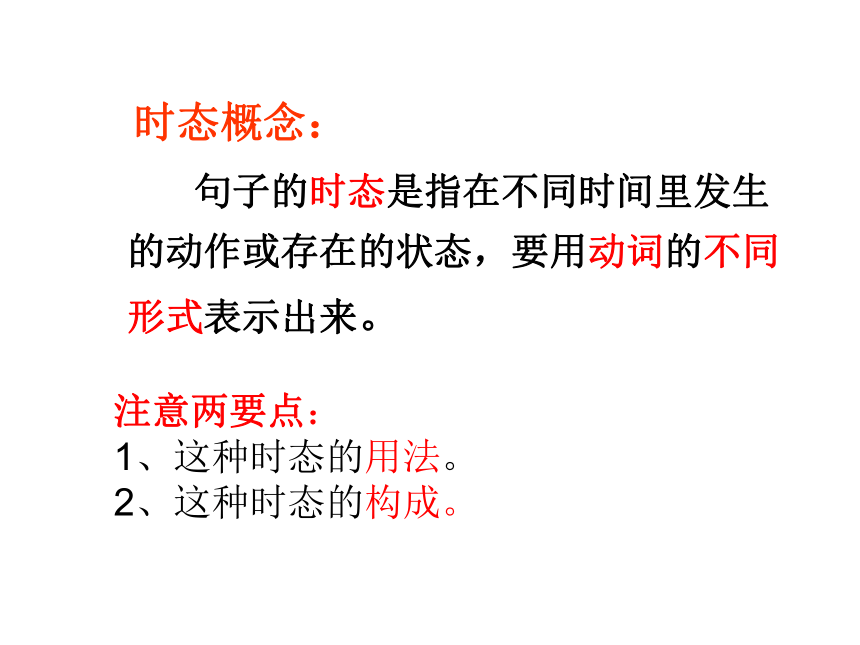
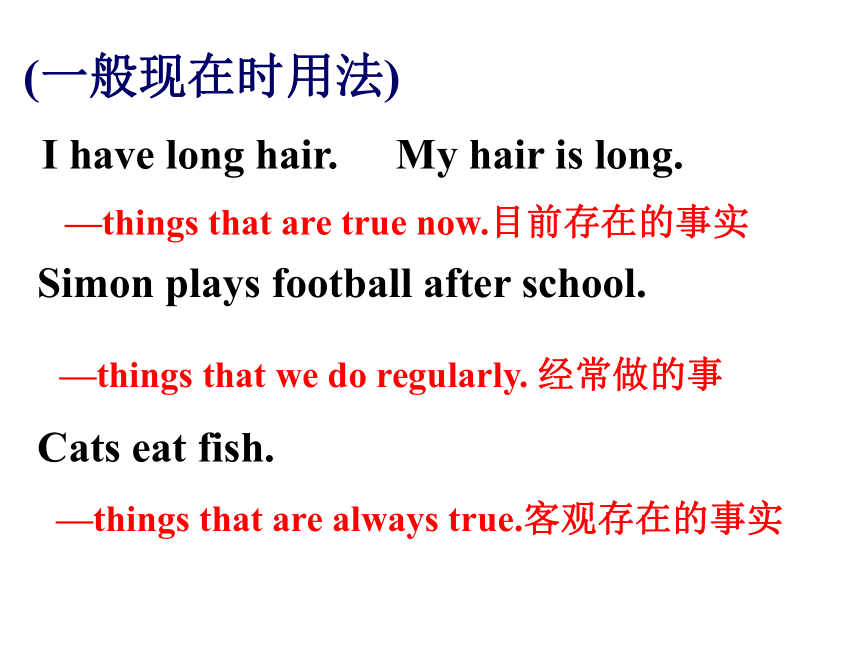
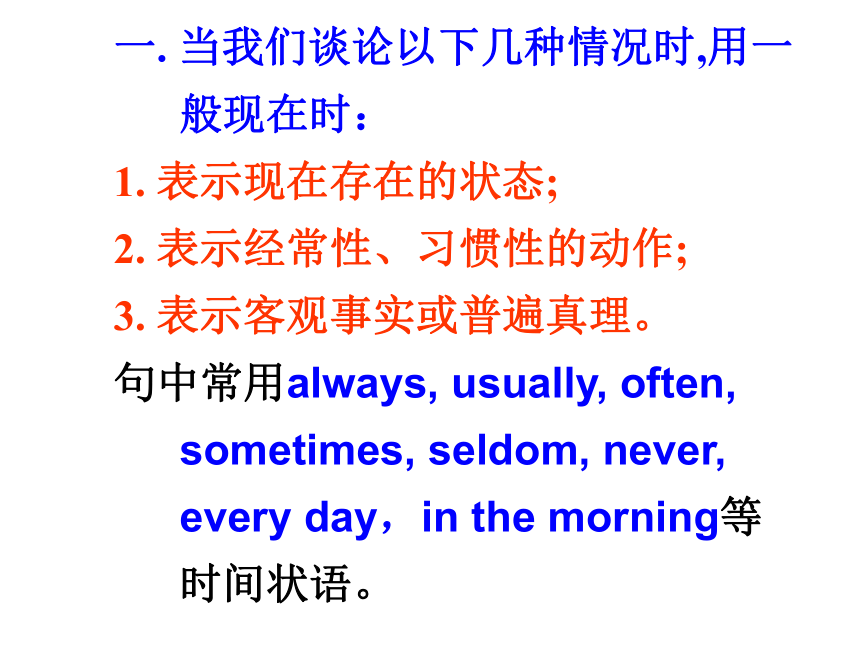
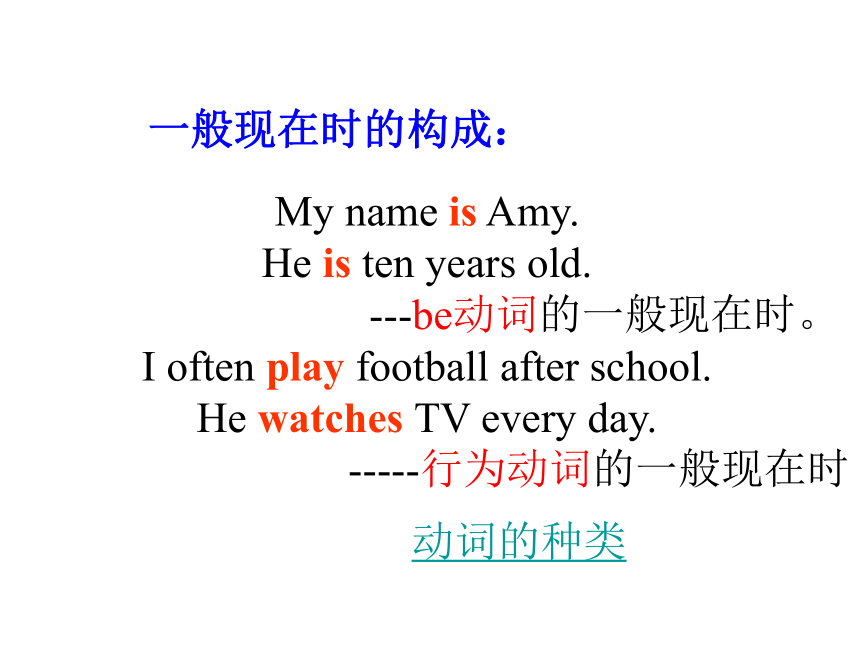
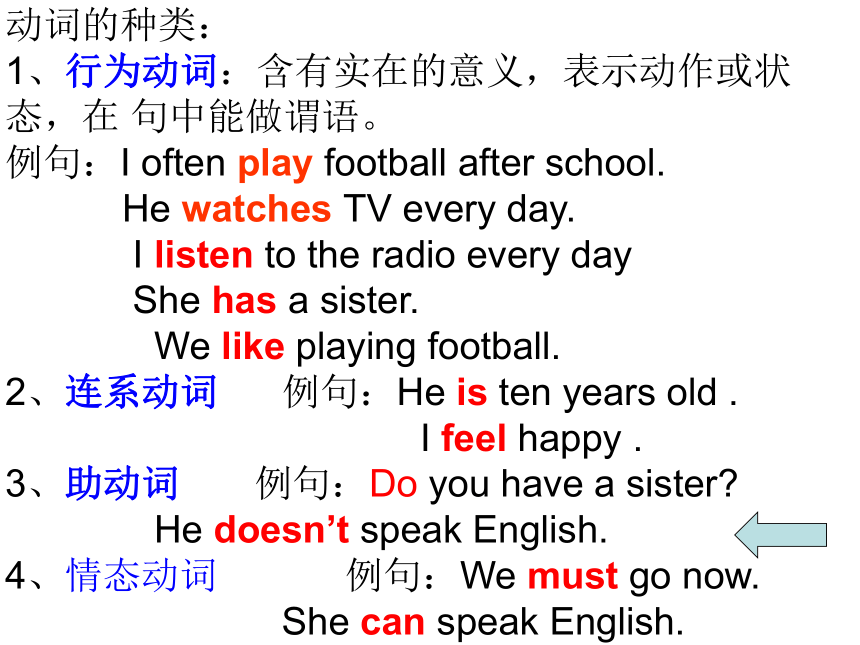

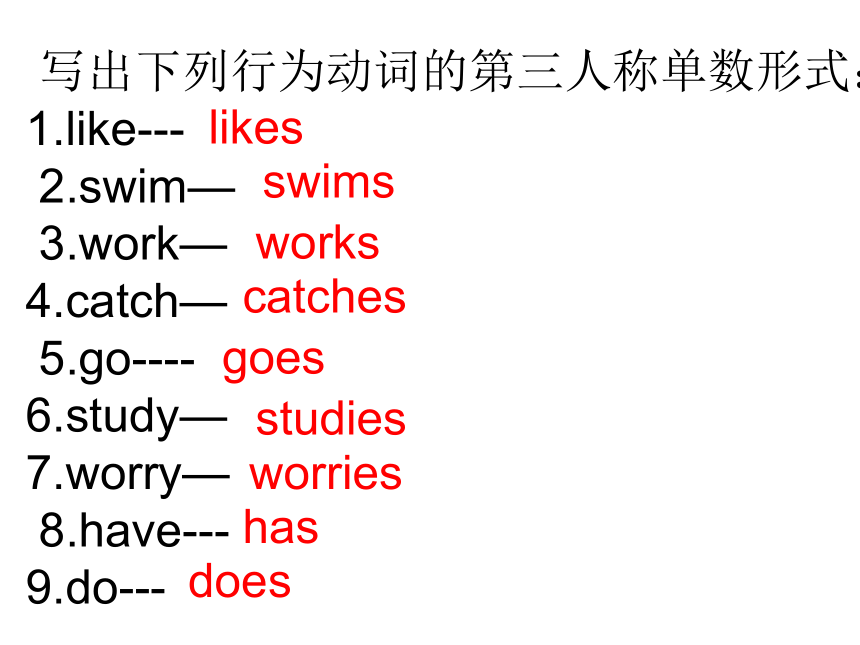
文档简介
课件23张PPT。 Unit 2
Let's play sports!GrammarGrammar
一般现在时
(Simple Present Tense )
--行为动词的一般现在时时态概念: 句子的时态是指在不同时间里发生的动作或存在的状态,要用动词的不同形式表示出来。注意两要点:
1、这种时态的用法。
2、这种时态的构成。(一般现在时用法)I have long hair. My hair is long.—things that are true now.目前存在的事实Simon plays football after school.—things that we do regularly. 经常做的事Cats eat fish.—things that are always true.客观存在的事实一. 当我们谈论以下几种情况时,用一般现在时:
1. 表示现在存在的状态;
2. 表示经常性、习惯性的动作;
3. 表示客观事实或普遍真理。
句中常用always, usually, often, sometimes, seldom, never, every day,in the morning等时间状语。一般现在时的构成:
My name is Amy.
He is ten years old.
---be动词的一般现在时。
I often play football after school.
He watches TV every day.
-----行为动词的一般现在时
动词的种类动词的种类:
1、行为动词:含有实在的意义,表示动作或状
态,在 句中能做谓语。
例句:I often play football after school.
He watches TV every day.
I listen to the radio every day
She has a sister.
We like playing football.
2、连系动词 例句:He is ten years old .
I feel happy .
3、助动词 例句:Do you have a sister?
He doesn’t speak English.
4、情态动词 例句:We must go now.
She can speak English.
行为动词的一般现在时的构成:(看例句并总结规律,
注意观察红色和蓝色字体。)
1、I play football every day .
2、You play football every day .
3、My friends play football every day .
4、He plays football every day .
5、Tom plays football every day .
6、My brother plays football every day .
总结规律:
当主语是第一、第二人称和第三人称复数时,行为动词使用其原形。当主语是第三人称单数时,行为动词使用其第三人称单数形式。
行为动词一般现在时的第三人称单数形式的构成方法见书117页。
主语是第三人称单数指的是:(举例说明) 写出下列行为动词的第三人称单数形式:
1.like---
2.swim—
3.work—
4.catch—
5.go----
6.study—
7.worry—
8.have---
9.do---likesswims workscatches goesstudiesworries hasdoes1. I _______(go) swimming on Sunday.
2. My cousin_______(enjoy) computer
games.
3. My parents__________(watch) TV.
4. Tom and Simon _______(like) fish.
5. He ___________(swim)every day.
6.Tom_______(play) football every
day.
gowatchlikeswimsplaysenjoys用所给词的适当形式填空行为动词一般现在时的否定句和一般疑问句。
1、I speak English.
否定句:I do not /don’t speak English.
一般疑问句:Do you speak English?
肯定回答:Yes, I do.
否定回答:No, I don’t.
2、He speaks English.
否定句:He does not /doesn’t speak English.
一般疑问句:Does he speak English?
肯定回答:Yes, he does.
否定回答:No, he doesn’t.
(注意蓝色和红色字体,总结规律。
行为动词一般现在时的否定句和一般疑问句
构成:
否定句:在行为动词前加do not或does not,
当主语是第三人称单数时,助动词用does.
在非正式行文中,do not和does not可以缩
写成don’t 和doesn’t.
一般疑问句:在句首加助动词do和does,当
主语是第三人称单数时,助动词用does.
注意:在疑问句和否定句中,助动词之后
的行为动词均用原形。
改错题:
1.I goes to school at six every day.
2.He don’t like playing football.
3. I am watch TV every day.
4. Daming watchs TV in the evening.
5. Does he usually has a party?
6. Our English doesn’t likes music.
7. Tony goes always to school at eight o’clock.
8. Does your parents like watching TV?
9. Lily haves lunch at school.
10. My sister doesn’t her homework every . _______________________________________ ________godoesn’t去掉amwatcheshavelikealways goes____dohasdoesn’t do注意:我们用一般现在时进行表达时,
不能同时使用be动词和行为动词行为动词一般现在时的构成:(小结)
肯定句:当主语是第三人称单数时,行为动
词用 。主语是非第三人称单数,行为
动词用 。
否定句:在行为动词前加 ,
当主语是第三人称单数时,助动词用
在非正式行文中,do not和does not可以缩
写成don’t 和doesn’t.
一般疑问句:在句首加助动词 ,当
主语是第三人称单数时,助动词用 .
注意:在疑问句和否定句中,助动词之后
的行为动词均用原形。
三单形式does原形do not或does notdo或doesdoes句型转换:
1、把下面句子改成一般疑问句并做肯定
和否定回答。2、改为否定句。
He watches TV every day.
2. I do my homework every day.
3. Lucy and Lily come from the USA.
4. She eats eggs every morning.
5. They do a lot of homework every
day.
6. I’m from Nanjing课本练习Millie and her classmatesdance go like play watch I _____ playing volleyball.
Kitty ______ very much.
Amy ______ swimming every week.
Simon often ______ football with his friends.
Daniel sometimes _______ball games on TV.likedancesgoesplayswatchesABUse the information to complete the questions. ____ Sandy and Kitty enjoy listening to
music?
___________.
2. ________ Millie like swimming?
_______________.课本练习Do Yes, they do Does No, she doesn’t3. ______ Amy enjoy reading?
_____________.
4. _______ Simon like walking?
_____________.
5. ______ Simon and Daniel love drawing?
_____________.Does Yes, she doesDoes No, he doesn’tDo No, they don’tCComplete Daniel and Simon’s conversation with the correct forms of the verbs in brackets.Daniel: Hi, Simon. _____ you ______ (play)
football at weekends?
Simon: Of course. I often ______ (play)
football with my cousins.课本练习Do playplayDaniel: _____ your parents _____ (go) with
you?
Simon: No, they don’t. But my dad
sometimes _______ (watch) our
games. Sometimes he _______
(read) at home. My mum often
_______ (shop) at weekends. What
about you, Daniel?
Daniel: I often ______ (stay) at home.
Sometimes I ____ (go) swimming
with my dad.Do go watchesreadsshopsstaygoLet’s correct:
I goes to school at six every day.
He don’t like playing football.
3. They likes playing games.
4. Millie watchs TV in the evening.
5. Does he often has a party?
6. Mr.Wu teachs us English.
7. Lily and Millie goes to school at eight
o’clock.
8. Do they eats food in the party?
9. Lily haves lunch at school.
godoesn’tlikewatcheshaveteacheshasgoeatHomework Review the grammar part again.
What do you like to do after school? Write them down. Use the simple present tense of the verb to do.
Let's play sports!GrammarGrammar
一般现在时
(Simple Present Tense )
--行为动词的一般现在时时态概念: 句子的时态是指在不同时间里发生的动作或存在的状态,要用动词的不同形式表示出来。注意两要点:
1、这种时态的用法。
2、这种时态的构成。(一般现在时用法)I have long hair. My hair is long.—things that are true now.目前存在的事实Simon plays football after school.—things that we do regularly. 经常做的事Cats eat fish.—things that are always true.客观存在的事实一. 当我们谈论以下几种情况时,用一般现在时:
1. 表示现在存在的状态;
2. 表示经常性、习惯性的动作;
3. 表示客观事实或普遍真理。
句中常用always, usually, often, sometimes, seldom, never, every day,in the morning等时间状语。一般现在时的构成:
My name is Amy.
He is ten years old.
---be动词的一般现在时。
I often play football after school.
He watches TV every day.
-----行为动词的一般现在时
动词的种类动词的种类:
1、行为动词:含有实在的意义,表示动作或状
态,在 句中能做谓语。
例句:I often play football after school.
He watches TV every day.
I listen to the radio every day
She has a sister.
We like playing football.
2、连系动词 例句:He is ten years old .
I feel happy .
3、助动词 例句:Do you have a sister?
He doesn’t speak English.
4、情态动词 例句:We must go now.
She can speak English.
行为动词的一般现在时的构成:(看例句并总结规律,
注意观察红色和蓝色字体。)
1、I play football every day .
2、You play football every day .
3、My friends play football every day .
4、He plays football every day .
5、Tom plays football every day .
6、My brother plays football every day .
总结规律:
当主语是第一、第二人称和第三人称复数时,行为动词使用其原形。当主语是第三人称单数时,行为动词使用其第三人称单数形式。
行为动词一般现在时的第三人称单数形式的构成方法见书117页。
主语是第三人称单数指的是:(举例说明) 写出下列行为动词的第三人称单数形式:
1.like---
2.swim—
3.work—
4.catch—
5.go----
6.study—
7.worry—
8.have---
9.do---likesswims workscatches goesstudiesworries hasdoes1. I _______(go) swimming on Sunday.
2. My cousin_______(enjoy) computer
games.
3. My parents__________(watch) TV.
4. Tom and Simon _______(like) fish.
5. He ___________(swim)every day.
6.Tom_______(play) football every
day.
gowatchlikeswimsplaysenjoys用所给词的适当形式填空行为动词一般现在时的否定句和一般疑问句。
1、I speak English.
否定句:I do not /don’t speak English.
一般疑问句:Do you speak English?
肯定回答:Yes, I do.
否定回答:No, I don’t.
2、He speaks English.
否定句:He does not /doesn’t speak English.
一般疑问句:Does he speak English?
肯定回答:Yes, he does.
否定回答:No, he doesn’t.
(注意蓝色和红色字体,总结规律。
行为动词一般现在时的否定句和一般疑问句
构成:
否定句:在行为动词前加do not或does not,
当主语是第三人称单数时,助动词用does.
在非正式行文中,do not和does not可以缩
写成don’t 和doesn’t.
一般疑问句:在句首加助动词do和does,当
主语是第三人称单数时,助动词用does.
注意:在疑问句和否定句中,助动词之后
的行为动词均用原形。
改错题:
1.I goes to school at six every day.
2.He don’t like playing football.
3. I am watch TV every day.
4. Daming watchs TV in the evening.
5. Does he usually has a party?
6. Our English doesn’t likes music.
7. Tony goes always to school at eight o’clock.
8. Does your parents like watching TV?
9. Lily haves lunch at school.
10. My sister doesn’t her homework every . _______________________________________ ________godoesn’t去掉amwatcheshavelikealways goes____dohasdoesn’t do注意:我们用一般现在时进行表达时,
不能同时使用be动词和行为动词行为动词一般现在时的构成:(小结)
肯定句:当主语是第三人称单数时,行为动
词用 。主语是非第三人称单数,行为
动词用 。
否定句:在行为动词前加 ,
当主语是第三人称单数时,助动词用
在非正式行文中,do not和does not可以缩
写成don’t 和doesn’t.
一般疑问句:在句首加助动词 ,当
主语是第三人称单数时,助动词用 .
注意:在疑问句和否定句中,助动词之后
的行为动词均用原形。
三单形式does原形do not或does notdo或doesdoes句型转换:
1、把下面句子改成一般疑问句并做肯定
和否定回答。2、改为否定句。
He watches TV every day.
2. I do my homework every day.
3. Lucy and Lily come from the USA.
4. She eats eggs every morning.
5. They do a lot of homework every
day.
6. I’m from Nanjing课本练习Millie and her classmatesdance go like play watch I _____ playing volleyball.
Kitty ______ very much.
Amy ______ swimming every week.
Simon often ______ football with his friends.
Daniel sometimes _______ball games on TV.likedancesgoesplayswatchesABUse the information to complete the questions. ____ Sandy and Kitty enjoy listening to
music?
___________.
2. ________ Millie like swimming?
_______________.课本练习Do Yes, they do Does No, she doesn’t3. ______ Amy enjoy reading?
_____________.
4. _______ Simon like walking?
_____________.
5. ______ Simon and Daniel love drawing?
_____________.Does Yes, she doesDoes No, he doesn’tDo No, they don’tCComplete Daniel and Simon’s conversation with the correct forms of the verbs in brackets.Daniel: Hi, Simon. _____ you ______ (play)
football at weekends?
Simon: Of course. I often ______ (play)
football with my cousins.课本练习Do playplayDaniel: _____ your parents _____ (go) with
you?
Simon: No, they don’t. But my dad
sometimes _______ (watch) our
games. Sometimes he _______
(read) at home. My mum often
_______ (shop) at weekends. What
about you, Daniel?
Daniel: I often ______ (stay) at home.
Sometimes I ____ (go) swimming
with my dad.Do go watchesreadsshopsstaygoLet’s correct:
I goes to school at six every day.
He don’t like playing football.
3. They likes playing games.
4. Millie watchs TV in the evening.
5. Does he often has a party?
6. Mr.Wu teachs us English.
7. Lily and Millie goes to school at eight
o’clock.
8. Do they eats food in the party?
9. Lily haves lunch at school.
godoesn’tlikewatcheshaveteacheshasgoeatHomework Review the grammar part again.
What do you like to do after school? Write them down. Use the simple present tense of the verb to do.
同课章节目录
- 预备课程
- Lesson 1 Nice to meet you !
- Lesson 2 A happy family
- Lesson 3 A nice school
- Lesson 4 You look cool !
- Lesson 5 Wonderful things
- Lesson 6 Have nice food
- Lesson 7 Enjoy our days
- Lesson 8 Let's have fun !
- Unit 1 This is me
- Unit 2 Let's play sports
- Unit 3 Welcome to our school
- Unit 4 My day
- Unit 5 Let’s celebrate
- Unit 6 Food and lifestyle
- Unit 7 Shopping
- Unit 8 Fashion
